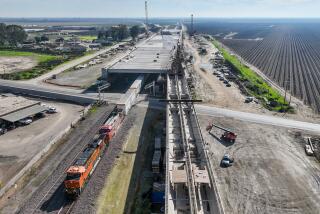RTD Yields, Delays Special Tax Until Metro Rail Starts Running
- Share via
Yielding to pressure from small downtown Los Angeles businesses, the president of the Southern California Rapid Transit District said Wednesday the beleaguered agency should stop collecting a special Metro Rail tax until the subway trains start running.
Property owners shrieked last fall when the new tax bills arrived, and RTD Board President Jan Hall said Wednesday the controversy threatened to weaken key private backing for the subway.
Approval to delay the tax collection until 1992--when the first leg is scheduled to open--is expected at the board’s Feb. 26 meeting. However, Hall said about $20 million collected from downtown property owners last December, when the first payments were due, will not be refunded.
Hall said complaints about the tax were heightened because “no one believed Metro Rail was coming to Los Angeles.” But the delay will give property owners time to plan for the tax increase or sell out, she said.
RTD to Borrow Funds
The “benefit assessment” tax is based on the presumption that property in much of downtown will grow in value once the subway is built. The RTD plans to raise $130 million by taxing private land owners, about a tenth of the $1.25 billion it is expected to cost to build the first 4.4-mile subway link through downtown. If the tax is deferred, the RTD expects to borrow the difference.
Taxes on individual properties went up by as much as 500%, leading many downtown land holders, especially those engaged in businesses far removed from the shiny high-rise financial district where the subway will run, to protest the way that the tax was levied.
Sam Rubinfeld, a manufacturer on run-down Los Angeles Street who represents 350 smaller property owners, said Wednesday he is pleased that the tax will not have to be paid until 1992. But he still questioned the basis of the tax, and said individual owners may sue.
“My properties are down in the Skid Row area of Los Angeles, and they went from $6,000 a year to $31,000,” Rubinfeld said. “The original assessment wasn’t fair, and I don’t think it’s going to be fair in three or four years.”
More affluent businesses closer to the subway route have squawked far less, and Chris Stewart, president of the Central City Assn., said they would whole-heartedly support Hall’s plan to defer the taxes. “They would like to be able to ride the Metro Rail as they pay the bill,” Stewart said.
No Reduction
The delay will not reduce any of the taxes due, Hall said. In fact, RTD officials said it would add about $45 million to the amount that property owners must pay, to cover increased costs of borrowing money. But the tax rate, which is now assessed at 30 cents per square foot, will probably rise by only a penny and could go down if more new offices are built downtown than now expected, Hall said.
This is the second time that outraged small property owners have pushed the RTD into revising its practices on the tax assessments. Under pressure last November, the RTD sharply reduced the fees that property owners were charged to file appeals against the assessment.
Some filing fees had totaled $5,000, and businesses protested since it ordinarily cost them nothing to appeal their regular county property tax bills.
The benefit assessment tax does not apply to residential or charitable properties. About 2,000 parcels are subject to the tax, RTD officials said.
More to Read
Sign up for Essential California
The most important California stories and recommendations in your inbox every morning.
You may occasionally receive promotional content from the Los Angeles Times.










